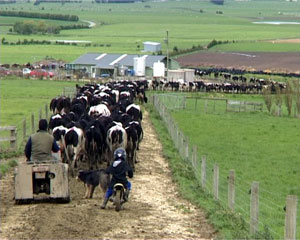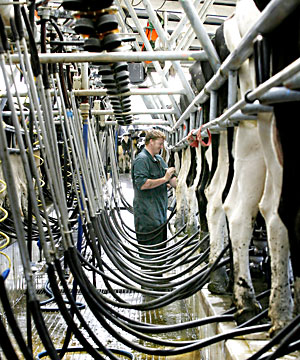Dairy Farmer
Tasks & duties
Most dairy farmers milk cows twice a day – once in the morning and again in the afternoon – while others milk once a day. Some dairy farmers milk seasonally and others milk all year. When milking cows, dairy farmers:

-
get the cows ready for milking
-
milk the cows using milking machinery
-
wash out pipes with water and detergent and clean the yard after milking
Dairy farmers also:
-
plan and manage the amount and type of food the cows eat
-
sort, drench, move, tag and monitor cows so they produce milk efficiently
-
organise breeding and mating of the herd
-
carry out general maintenance such as fencing and spraying weeds around the farm
-
manage the health of animals
-
keep financial and farming records, and organise the farm business plan
-
make extra feed such as hay and silage in summer
-
manage calving of the dairy herd
-
rear calves and prepare them to milk in the herd
-
maintain optimum soil fertility
-
maintain equipment and farm vehicles, such as farm bikes and tractors
-
ensure compliance with Occupational Safety and Health (OSH) regulations
-
employ people to work on the farm
Specialisations
Contract Milker
Contract milkers pay for a percentage of the farm costs (without owning the cows) and receive a percentage of the profits.
Dairy Farm Owner
Dairy farm owners own their own land and stock.
Herd Manager
Herd managers are paid a wage to look after a herd.
Sharemilker
Sharemilkers either milk a dairy farmer's cows for a profit share, or own a herd of cows and milk them on an owner's land for a profit share.
Skills & knowledge

Dairy farmers need to have:
-
good animal-handling skills and an understanding of animal welfare
-
an understanding of pasture management practices to ensure production is maximised
-
knowledge of the milk harvesting process
-
an awareness of milk company standards and safe practices on the farm
-
practical skills to complete farm maintenance, and operate and use machinery
-
accounting and general business skills
-
good people management skills, particularly on large farms where staff are employed
-
driving skills
Entry requirements
There are no specific entry requirements to become a dairy farmer, although a motorcycle and heavy vehicle driver's licence may be useful.
Secondary education
At least three years of secondary school education is recommended and useful subjects include economics, accounting and maths.
Tertiary education
A relevant training course in agriculture or dairy farming is recommended. Specific agribusiness or farm management courses may be helpful.
Training on the job
Many skills are learned on the job. Dairy farmer discussion groups are run by dairy industry groups, companies, and government agencies.
Useful Experience
Any farming, outdoor, or labouring experience is useful for dairy farmers.
Related courses
Agricultural Science
Animal Husbandry
Farm Management and Agribusiness
For more information, please refer to myfuture.
Document Actions
